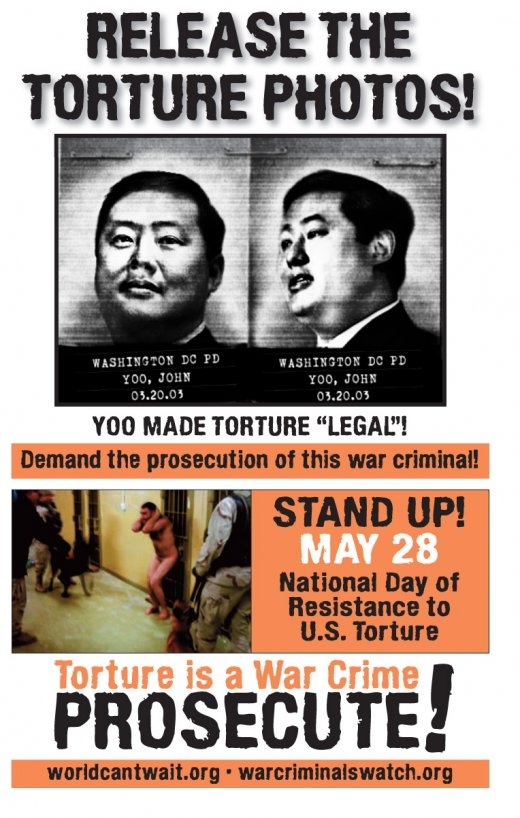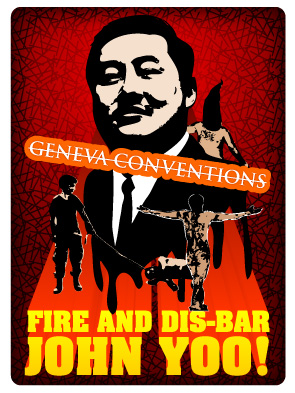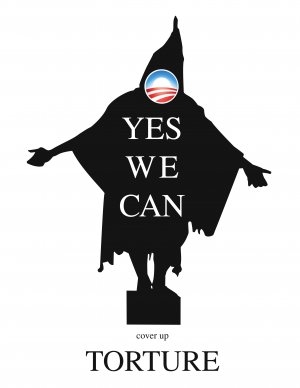
RADIO TIMES w/ MARTY MOSS-COANE![]()
BRIAN TIERNEY, Publisher of the Philadelphia Inquirer and Daily News senior writer WILL BUNCH discuss the issues around hiring John Yoo as a commentator for the Philadelphia Inquirer. 11:00 a.m. Call in number is 1-888-477-9499
IT’S OUR CITY: Will Bunch is the Philadelphia Daily News staff writer and blogger who raised hell when he found out that torture memo author John Yoo was now a monthly columnist for The Philadelphia Inquirer.
Seeking more information about all of this, I emailed the Inquirer’s editorial page editor, Harold Jackson,
this afternoon. What exactly was Yoo’s arrangement with the Inquirer, how much is he paid, and how much weight — if any — did the editors give to the notion they were awarding a regular column who’s been accused of unethical lawyering by some, and war crimes by others?
Both papers are owned by the same company, Philadelphia Media Holdings Inc. The Publisher of both papers is Brian Tierney who defends the paper’s hiring of John Yoo. MORE
PREVIOUSLY: HECKUVA JOB TIERNEY: Why Is THIS Man Bloviating About Supreme Court Replacements In The Inquirer?
PREVIOIUSLY: Spanish Prosecutors To Bring Bush 6 Up On Charges
PREVIOUSLY: A New Low In The History Of Lame Excuses
PREVIOUSLY: YOO HOOEY: Inky’s Harold Jackson And Daily News’ Will Bunch Trade Blows Over ‘Torture Guy’ Editorialist
PREVIOUSLY: HOT DOC: Disbarment Complaint Against John Yoo
PREVIOUSLY: SATIRE: Inky Names Michael Vick Pet Care Columnist
PREVIOUSLY: Look Ma, Stephen Colbert On Inky/Yoo Controversey
RELATED: WHERE’S THE BEEF: Inquirer Puff Piece On Glenn Beck Long On Froth, Short On Questioning All The Hateful Moronic Things He Has Said Over The Years
RELATED: In April 2004, when the Harman and Graner photographs were leaked to the press, they shocked the world’s conscience. They also performed a great public service. They told us something about ourselves that we might have suspected but did not fully know — that the Bush administration had decided to fight terror with terror, and torture with torture.
We did not fully know this before the photographs came out, because our leaders hid it from us, and when it was revealed they denied it. “We do not torture,” Mr. Bush kept saying, even as a stream of official documents leaked to the press contradicted him.
 Had a journalist taken the photos, there would have been prizes. Instead, the photographs were used by the administration and the military to frame the soldiers who took and appeared in them as rogues acting out of their own individual perversity. In this way, the exposé became the cover-up: the soldiers who revealed our corruption to us were made scapegoats and thrown in prison.
Had a journalist taken the photos, there would have been prizes. Instead, the photographs were used by the administration and the military to frame the soldiers who took and appeared in them as rogues acting out of their own individual perversity. In this way, the exposé became the cover-up: the soldiers who revealed our corruption to us were made scapegoats and thrown in prison.
Five years later, America is again caught up in a debate about the release of photographs that show our soldiers using Bush administration “interrogation techniques” at Abu Ghraib and elsewhere. Barack Obama, whose first act as president was to re-criminalize torture, initially favored making the pictures public. Then Mr. Obama changed his mind. His critics (civil libertarians, human rights advocates and press commentators) are saying that this makes him no different from his predecessor. MORE
NEW YORK TIMES: Despite opening six investigations, the Pentagon made no further accounting to the public or to Congress. Indeed, a horrifying report commissioned by the Army was classified “secret,” although Mr. Rumsfeld had to admit yesterday that he did not know why. Mr. Rumsfeld also said, unbelievably, that he had not yet finished reading the report on the Abu Ghraib prison. At another point he seemed to shrug off the brutal treatment of the prisoners as the sort of thing that can happen in a system that is not “perfect”; a distressing echo of his costly dismissal of the  looting in Baghdad last year as the “untidiness” of freedom. With the administration’s familiar disdain for public disclosure, the Pentagon did not share the report with Congress until it was forced to do so this week, after the report was described in a New Yorker article. There are still many unanswered questions, about issues like the military’s failure to train prison guards properly and the role of military intelligence and private contractors in the abuses. MORE
looting in Baghdad last year as the “untidiness” of freedom. With the administration’s familiar disdain for public disclosure, the Pentagon did not share the report with Congress until it was forced to do so this week, after the report was described in a New Yorker article. There are still many unanswered questions, about issues like the military’s failure to train prison guards properly and the role of military intelligence and private contractors in the abuses. MORE
